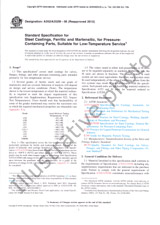We need your consent to use the individual data so that you can see information about your interests, among other things. Click "OK" to give your consent.
ASTM F1787-98(2020)
Standard Test Method for Performance of Rotisserie Ovens
Translate name
STANDARD published on 1.7.2020
The information about the standard:
Designation standards: ASTM F1787-98(2020)
Publication date standards: 1.7.2020
SKU: NS-1002488
The number of pages: 12
Approximate weight : 36 g (0.08 lbs)
Country: American technical standard
Category: Technical standards ASTM
The category - similar standards:
Cooking ranges, working tables, ovens and similar appliances
Annotation of standard text ASTM F1787-98(2020) :
Keywords:
cook time, energy efficiency, performance, production capacity, rotisserie oven, shrinkage, test method, yield,, ICS Number Code 97.040.20 (Cooking ranges, working tables, ovens and similar appliances)
Additional information
| Significance and Use | ||||
|
5.1 The energy input rate test is used to confirm that the rotisserie oven is operating properly prior to further testing. 5.2 Preheat energy and time can be useful to food service operators to manage energy demands and to know how quickly the rotisserie oven can be ready for operation. 5.3 Idle energy rate and pilot energy rate can be used by the food service operator to estimate energy consumption during non-cooking periods. 5.4 Cooking energy efficiency is a precise indicator of rotisserie oven energy performance under various loading conditions. This information enables the food service operator to consider energy performance when selecting a rotisserie oven. 5.5 Production capacity is used by food service operators to choose a rotisserie oven that matches their food output requirements. 5.6 Holding energy rate may be used to determine the cost of holding cooked product in the rotisserie oven. 5.7 Product yield may be used by the food service operator to compare relative product output from one rotisserie oven to another. Additionally, product shrinkage during holding may be used by the food service operator to evaluate the rotisserie oven's performance when holding cooked product. |
||||
| 1. Scope | ||||
|
1.1 This test method evaluates the energy consumption and cooking performance of rotisserie ovens. The food service operator can use this evaluation to select a rotisserie oven and understand its energy performance. 1.2 This test method is applicable to thermostatically-controlled gas and electric rotisserie ovens designed for batch cooking. 1.3 The rotisserie oven can be evaluated with respect to the following (where applicable): 1.3.1 Energy input rate (10.2), 1.3.2 Preheat energy and time (10.4), 1.3.3 Idle energy rate (10.5), 1.3.4 Pilot energy rate, if applicable (10.6), 1.3.5 Cooking energy efficiency and production capacity (10.9), and 1.3.6 Holding energy rate and product shrinkage (optional, 10.10), 1.4 The values stated in inch-pound units are to be regarded as standard. The values given in parentheses are mathematical conversions to SI units that are provided for information only and are not considered standard. 1.5 This standard does not purport to address all of the safety concerns, if any, associated with its use. It is the responsibility of the user of this standard to establish appropriate safety, health, and environmental practices and determine the applicability of regulatory limitations prior to use. 1.6 This international standard was developed in accordance with internationally recognized principles on standardization established in the Decision on Principles for the Development of International Standards, Guides and Recommendations issued by the World Trade Organization Technical Barriers to Trade (TBT) Committee. |
||||
| 2. Referenced Documents | ||||
|
We recommend:
Technical standards updating
Do you want to make sure you use only the valid technical standards?
We can offer you a solution which will provide you a monthly overview concerning the updating of standards which you use.
Would you like to know more? Look at this page.




 Cookies
Cookies
